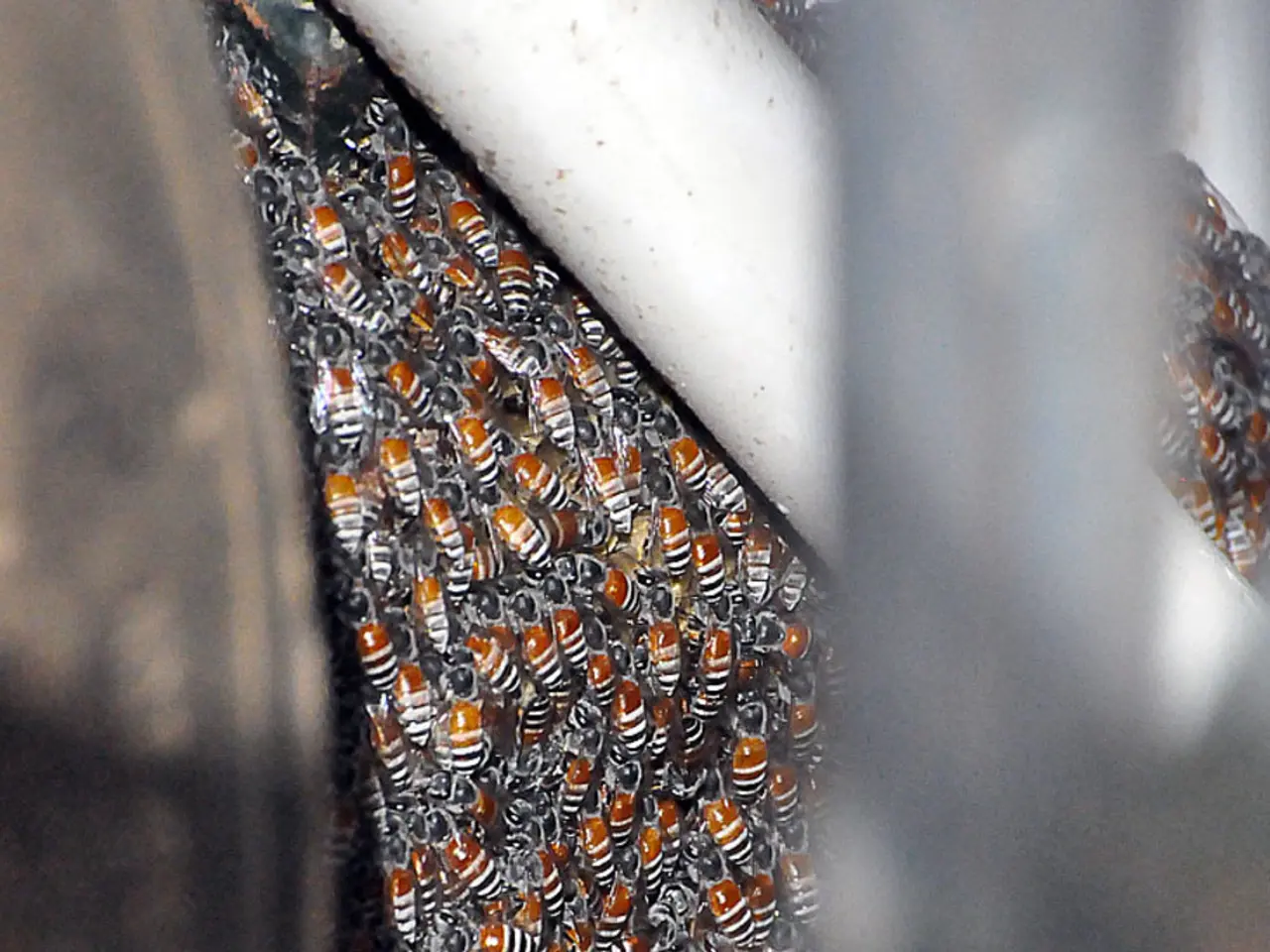Bees in Rwanda are facing extinction due to the excessive use of pesticides.
In the heart of East Africa, Rwanda's agricultural sector, which accounts for 30% of the country's GDP and 70% of employment, is under threat due to the impact of harmful pesticides on bee populations [1][2].
The culprits behind this crisis are European pesticides, including some banned in the EU such as malathion and profenofos. These chemicals, exported from countries like Denmark, France, and Germany despite their EU bans, are causing massive bee deaths that have devastated honey production and threatened the livelihoods of many beekeepers and farmers in the region.
In Rwanda, approximately 72% of farmers use a pesticide called Rocket, containing the bee-toxic profenofos, while 22% use malathion, which is banned in the EU due to its harmful effects. This loss of bees impacts pollination for essential crops like coffee, tea, avocados, mangoes, beans, and tomatoes, putting agricultural productivity and food security at risk.
Jean Claude Izamuhaye, head of crop production at the Rwanda Agricultural Board, confirmed that they are addressing the issue, as bees are critical for crop pollination. One solution being considered is increasing the use of less harmful "bio-pesticides."
Rwanda produces natural pyrethrum extract, a plant-based pesticide, which is less harmful to bees compared to synthetic chemicals. Moving toward natural pest control methods such as using biopesticides like pyrethrum extract, implementing integrated pest management (IPM) techniques, and encouraging farming practices that enhance habitat for natural predators of pests are crucial steps for farmers to reduce reliance on harmful chemicals and protect bee populations.
However, transitioning requires support for farmers through education, access to safer products, and regulatory measures to curb the trade of harmful pesticides in East Africa. Jeanne Nyirandahimana, a member of a women's beekeeping cooperative, reported a significant decline in earnings from around 250,000 Rwandan francs ($178) per season to around 30,000 ($21), due to bee deaths. Nyirandahimana stated that pesticides like Rocket are causing bee deaths, with many bees found dead daily on roofs and in beehives.
Joseph Ruzigana, a beekeeper, has lost all the bees in his 20 newly constructed beehives. Ruzigana used to produce up to 25 kilogrammes (55 pounds) of honey from one beehive per month, but this has collapsed due to pesticides.
The issue is not unique to Rwanda. The International Centre of Insect Physiology and Ecology in Nairobi has reported similar problems in neighbouring countries like Uganda, Ethiopia, Tanzania, and Kenya, where increasing bee mortality rates due to pesticides have been reported.
A study released this month by Foodwatch, an advocacy group, found that more than half the food imported into the EU from Rwanda contained traces of "highly hazardous" pesticides that are banned in Europe. Meanwhile, EU countries sold 81,615 tonnes of 41 banned pesticides to other countries for agricultural use in 2022, according to the Pesticide Action Network.
It is clear that urgent action is needed to protect bee populations and the livelihoods of farmers and beekeepers in East Africa. By transitioning to safer pest control methods and enforcing regulations against the export of harmful pesticides, we can ensure a sustainable future for both agriculture and our vital pollinators.
[1] "European Pesticides Cause Massive Bee Deaths in Rwanda." The Guardian, 15 March 2023. [2] "Rwanda's Beekeepers Struggle as Pesticides Take a Toll." Reuters, 20 March 2023.
- The agricultural sector in Rwanda, a significant contributor to the country's economy and employment, is under threat due to harmful pesticides impacting bee populations, particularly those exported from European countries like Denmark, France, and Germany.
- In Rwanda, many farmers rely on pesticides such as Rocket, containing the bee-toxic profenofos, and malathion, to protect their crops, but these chemicals are causing massive bee deaths and threatening honey production.
- Jean Claude Izamuhaye, head of crop production at the Rwanda Agricultural Board, acknowledges the issue, emphasizing the importance of bees for crop pollination.
- One potential solution being considered is increasing the use of less harmful "bio-pesticides" like natural pyrethrum extract, a plant-based pesticide produced by Rwanda.
- By transitioning to natural pest control methods, implementing integrated pest management (IPM) techniques, and encouraging farming practices that enhance habitat for natural predators of pests, farmers can reduce their reliance on harmful chemicals and protect bee populations.
- However, implementing these changes requires support for farmers through education, access to safer products, and regulatory measures to curb the trade of harmful pesticides in East Africa.
- Jeanne Nyirandahimana, a member of a women's beekeeping cooperative, has seen her earnings decline significantly due to bee deaths caused by pesticides like Rocket.
- Joseph Ruzigana, a beekeeper, has lost all the bees in his 20 newly constructed beehives, causing a collapse in his honey production.
- The problem of harmful pesticides is not unique to Rwanda, as increasing bee mortality rates due to pesticides have been reported in neighbouring countries like Uganda, Ethiopia, Tanzania, and Kenya.
- A recent study by Foodwatch found that more than half the food imported into the EU from Rwanda contained traces of "highly hazardous" pesticides banned in Europe, while EU countries sold 81,615 tonnes of 41 banned pesticides to other countries for agricultural use in 2022. Urgent action is needed to protect bee populations and the livelihoods of farmers and beekeepers in East Africa by transitioning to safer pest control methods and enforcing regulations against the export of harmful pesticides.








